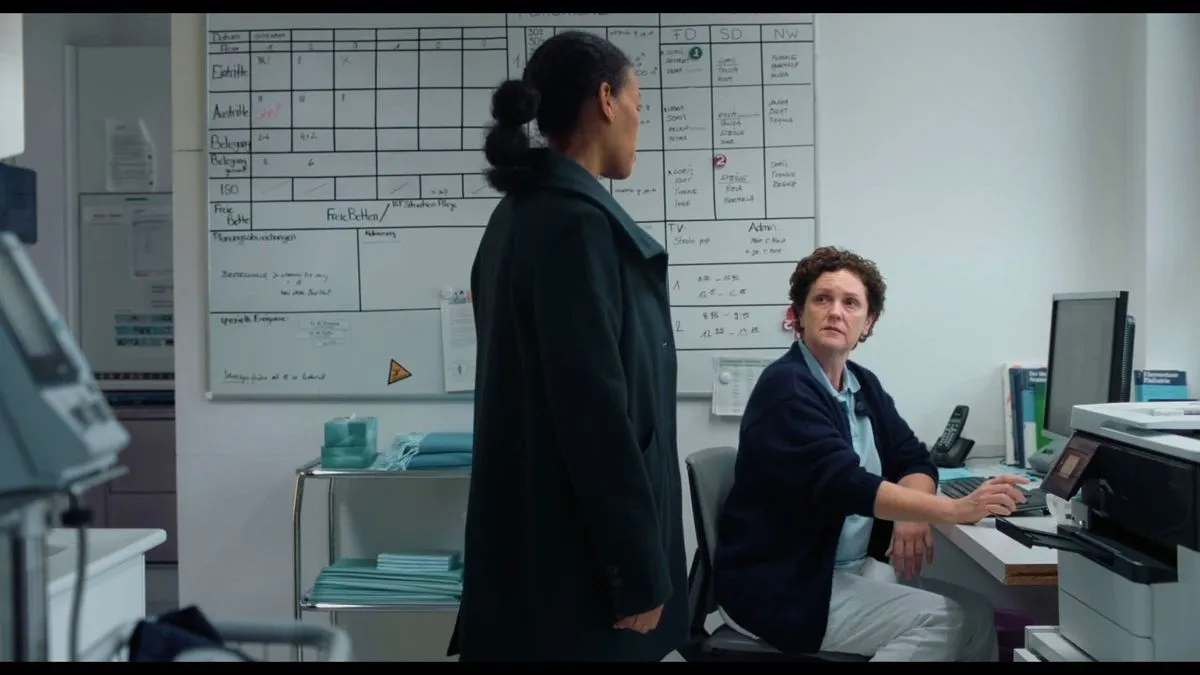Caterina Mona’s directorial debut Semret is a measured and intimate exploration of migration, trauma, and the complexities of a mother-daughter relationship within the framework of an Eritrean immigrant experience in Switzerland. Set in Zurich, the film gently unpacks the weight of Semret’s past—a past that lingers unspoken between her and her daughter, Joe, as they navigate their lives in a new, foreign land.
The central narrative of Semret thrives on its nuanced portrayal of a woman caught between her deeply ingrained fears and her longing to give her daughter a life beyond the trauma she herself endured. At the heart of the film lies a subtle but powerful conflict: Semret’s overprotectiveness of Joe, which stems from her own unresolved pain, juxtaposed against the growing independence of her teenage daughter.
The film doesn’t rush to explain Semret’s trauma but allows it to unfold gradually, drawing the audience into her quiet, sometimes suffocating world. This restraint is key to the emotional resonance of the film, inviting viewers to not just watch the events unfold, but to feel the emotional undercurrents that influence every interaction between mother and daughter.
Through a blend of intimate, observational direction and natural performances from the lead actors, Semret builds a slow-burn tension that gradually peels back the layers of its characters, revealing how deeply past trauma can shape one’s present—and how difficult it can be to break free from it. The film’s pacing is deliberate, with moments of stillness allowing the emotional depth of its central relationship to breathe, creating space for contemplation on the complexities of healing and growth.
The Weight of Migration: Trauma, Identity, and Generational Divide in Semret
At its heart, Semret is a poignant exploration of the migrant experience—one that speaks to the complexities of identity, trauma, and belonging. The film portrays how migration reshapes not just the environment a person lives in but the very essence of who they are. For Semret, an Eritrean immigrant working as a nursing assistant in Zurich, her sense of self is defined by a fractured past and a present filled with quiet but undeniable struggles.
The generational divide between Semret and her daughter, Joe, highlights this tension between the past and the present. While Semret seeks to protect Joe from the harshness of the world, she unwittingly imposes her own trauma onto her daughter. Her overprotectiveness, driven by her unspoken fears and the scars left by her migration journey, manifests in a need to control Joe’s life choices—particularly her connection to their Eritrean roots.
Joe, a teenager coming of age in a foreign land, yearns for independence and a deeper connection to her heritage. Yet, Semret’s resistance to letting Joe explore this part of her identity is a powerful reminder of the emotional weight that migrants carry when they attempt to shield their loved ones from the past.
The silence surrounding Semret’s husband’s fate adds an extra layer of complexity to this tension. The absence of answers, coupled with the deep trauma that comes from losing him, forms the emotional core of her internal conflict.
The film doesn’t dwell on overt revelations, but instead lets this loss simmer beneath the surface, manifesting in her cautious interactions with those around her and her hesitation to reconnect with her Eritrean community. It’s a subtle yet powerful commentary on the difficulty many immigrants face when trying to reconcile the need for integration with the painful pull of their origins.
In its portrayal of the precariousness of the immigrant experience, Semret captures the constant pressure to “do right” in order to fit in, a burden that Semret feels keenly. The film delicately weaves this idea throughout its narrative, showing how Semret, despite her hard work and resilience, is still treated as an outsider, kept at arm’s length from advancement both professionally and socially.
This creates an emotional tension that underscores the difficulty of moving forward when one’s past remains unresolved. The quiet moments of the film, paired with the growing distance between mother and daughter, build an emotional weight that lingers long after the credits roll.
A Quiet Strength: Character Development and Performances in Semret
In Semret, Lula Mebrahtu delivers a quietly powerful performance as the eponymous character, capturing the emotional depth of a woman caught between the weight of her past and the desire to protect her daughter from the same pain. Mebrahtu’s portrayal is marked by a subtle yet compelling physicality that conveys both Semret’s strength and vulnerability.
The film doesn’t rely on overt exposition to define her trauma; instead, Mebrahtu communicates it through her movements, the way she hesitates before speaking, or how she withdraws into herself in moments of emotional distress. There’s a rawness to her performance, a deep internal struggle that doesn’t need to be voiced to be felt.
This restraint, coupled with the powerful silences throughout the film, allows the audience to read the complexity of Semret’s emotional landscape without overt dialogue. It’s in these moments of quiet reflection that Mebrahtu’s talent shines, embodying a character who has learned to shield her pain from the world while quietly carrying it with her.
Hermela Tekleab’s portrayal of Joe offers an equally nuanced performance, reflecting the natural turbulence of adolescence with the added weight of her mother’s secrecy and overprotectiveness. Joe’s character is in many ways caught between two worlds: the world of her mother’s trauma, which she can’t fully understand, and the world of her own desire for independence, including a yearning to connect with her roots.
Tekleab masterfully conveys this internal conflict, portraying Joe’s quiet rebellion and search for identity with authenticity and depth. As the film progresses, Joe’s evolving relationship with her mother becomes one of the most compelling elements, with Tekleab balancing moments of frustration and vulnerability as she begins to challenge the emotional barriers Semret has placed around her.
Tedros Teclebrhan, as Yemane, brings a different but equally important energy to the film. His portrayal of the Eritrean hospital worker who begins to play a crucial role in Semret’s emotional journey is marked by a warmth that contrasts with the film’s overall reserved tone. Yemane, who subtly supports Semret without overstepping, offers a quiet mirror to her struggles, becoming someone who sees past her defenses.
His potential as a romantic interest is not framed as a typical subplot; rather, his role helps guide Semret toward confronting her past. The relationship between them is built not on grand gestures but on small, significant moments that allow Semret to begin opening up, suggesting that healing often comes from the most unexpected places.
Each of these performances enhances the film’s emotional impact, illustrating how characters grow and shift, not through dramatic confrontations, but through the small, intimate exchanges that slowly unravel their histories and dreams. The understated nature of the performances amplifies the film’s thematic exploration of trauma and healing, leaving a lingering emotional resonance that sticks with the viewer long after the film ends.
A Quiet, Observational Journey: Cinematic Style and Direction in Semret
Caterina Mona’s direction in Semret is steeped in an observational style that draws heavily from her background in documentary filmmaking. This approach serves the film’s intimate narrative well, allowing the camera to linger on moments that would otherwise go unnoticed, much like how a documentary filmmaker might capture the unspoken complexities of daily life.
Mona’s method is subtle, not demanding attention but rather allowing it to be earned, mirroring the internal struggles of her protagonist. The quiet pace of the film invites the viewer into a space of reflection, where the silence between characters speaks as loudly as the dialogue. This allows for a deep emotional engagement, as the audience is not simply told the story, but allowed to feel it unfold in real time.
The contemplative tone of Semret works hand-in-hand with its themes of internal conflict and healing. Mona doesn’t rush Semret’s emotional journey; instead, she lets the camera sit with the character, giving the audience time to process her unspoken trauma and her attempts to protect her daughter.
This approach is not about grand gestures or overt storytelling; it’s in the smallest moments—like the subtle glance Semret shares with her daughter or her withdrawn posture in her small apartment—that the film’s true power lies. The pacing complements this, taking its time to show rather than tell, allowing for the natural progression of Semret’s emotional unraveling.
Mona also emphasizes realism and authenticity, especially in her portrayal of the immigrant experience in Switzerland. The film is grounded in the everyday struggles of Semret as she juggles her job at a maternity ward, her complicated relationship with her daughter, and her yearning for a life that seems just out of reach. The film avoids sensationalizing the immigrant experience, instead focusing on the nuances—the awkwardness of not quite fitting in, the emotional toll of striving for something better, and the quiet resignation that comes with feeling perpetually “other.”
The bilingual use of Tigrinya and Swiss-German further deepens the emotional texture of the narrative. The shifts between languages highlight the cultural dislocation Semret feels—she is caught between her Eritrean roots and her life in Switzerland. These moments are not just linguistic choices, but emotional ones that underscore the disconnection that defines Semret’s life. The language barrier is subtle but significant, reinforcing the notion of isolation in a world that constantly asks Semret to adapt, yet refuses to fully embrace her.
Visually, Mona’s film is intimate and focused on the emotional isolation of its characters. Close-ups are used effectively to capture moments of inner turmoil, especially in scenes where words are absent but emotions are palpable. The visual choices create a space where the audience can observe the details—the way Semret moves through her day, the tension in her face, the quiet exhaustion that colors every action. These intimate shots allow for an immersive experience that feels almost personal.
Finally, the film’s minimalistic soundtrack complements its subdued aesthetic. Rather than using music to dictate the emotional tone, the score often remains sparse, allowing the silence to fill the gaps and letting the emotions breathe naturally. This restraint in the soundtrack mirrors the restraint in the film itself—a quiet, almost meditative exploration of trauma, healing, and the delicate nature of connection. In Semret, silence is just as powerful as sound, with every moment carefully constructed to draw the viewer deeper into the emotional landscape of its characters.
Navigating Belonging: Social Commentary on Immigration and Integration in Semret
At its core, Semret is a reflective commentary on the immigrant experience, particularly the struggles faced by Eritrean refugees in Switzerland. The film is not simply about migration but about the delicate balance between the desire for integration and the trauma that makes it difficult to fully embrace a new identity. Through the eyes of its protagonist, Semret, Semret vividly portrays the alienation that immigrants face as they try to build lives in societies that often treat them as “other.”
One of the film’s most poignant critiques centers on the systemic obstacles that immigrants encounter, particularly in the professional realm. Semret, despite her qualifications and years of experience, faces a recurring barrier: the lack of recognition for her credentials in Switzerland.
This issue resonates deeply, especially within communities where immigrants are often relegated to low-wage or entry-level positions, regardless of their previous achievements. The film’s quiet depiction of this struggle speaks to the broader issue of how institutions fail to recognize the full potential of immigrants, effectively stalling their professional growth.
The film also offers a nuanced view of the Eritrean community in Zurich, highlighting the complexities of belonging within a diaspora. Semret’s avoidance of her community is particularly telling—she distances herself from her fellow Eritrean migrants, avoiding potential connections with people who might share her cultural background. This self-imposed isolation reflects her internal conflict: her desire to assimilate and the deep-rooted trauma that keeps her from embracing the community that could offer support.
The generational divide between Semret and her daughter, Joe, serves as an effective metaphor for the integration process. While Semret clings to the past, resisting full engagement with her heritage or her new life in Switzerland, Joe represents the younger generation’s push to forge their own identity—one that often leans more towards Swiss culture than Eritrean traditions. This dynamic underscores the tension between the desire to belong to a new society and the pull of ancestral roots, showing the complex layers of integration that play out not only on an individual level but across generations.
Swiss society itself is presented in an ambiguous light—on one hand, it is a place of opportunity and stability, but on the other, it is fraught with cultural and racial prejudices. While there is an outward sense of acceptance, Semret deftly explores the underlying challenges that immigrants face when attempting to break through these societal barriers. Semret’s struggle to advance in her career, despite her evident capability, serves as a subtle but powerful critique of the ways in which Swiss society keeps certain groups at the periphery.
Midwifery as Metaphor: Symbolism and Rebirth in Semret
In Semret, the motif of midwifery plays a crucial symbolic role, extending far beyond its literal function within the story. Semret’s aspiration to become a midwife represents her longing for a new beginning—a chance to create life where her own has been marked by loss and trauma.
The dream of becoming a midwife is not just a career goal but a quiet hope for renewal, a way for Semret to step out of the shadows of her past and embrace the possibility of a future that is not defined by the scars of her history. In this sense, midwifery functions as a metaphor for both physical and emotional rebirth, a theme that runs deeply throughout the film.
Childbirth in the film becomes an essential symbol for Semret’s personal healing process. The act of bringing new life into the world is juxtaposed with the emotional void that Semret has carried with her since her migration from Eritrea. By working in the maternity ward, she engages with both the joys and the raw realities of life—exposed to the visceral, unsanitized details of birth, which are not glamorized but shown with honesty. This grounding in the physicality of life and death allows the audience to see Semret’s own journey more clearly, as she navigates the complexities of confronting her past trauma and finding a way to embrace her emotional vulnerability.
Semret’s professional aspirations mirror her emotional arc. The progress she makes toward realizing her dream of becoming a midwife aligns with her gradual steps toward confronting her pain, letting go of the burdens she has carried in silence. The film’s setting in the maternity ward, with its stark and intimate depictions of birth, offers a visceral contrast to the more reserved and internalized nature of Semret’s character, allowing the audience to experience her emotional growth through the physicality of the world she works in. Each new life she helps bring into the world subtly mirrors her own journey toward emotional release and the hope of a fresh start.
A Quiet Triumph: The Lasting Impact of Semret
Semret stands as a deeply sensitive portrayal of the immigrant experience, offering an intimate and authentic look at the struggles faced by Eritrean migrants, particularly immigrant women trying to carve out a new life in a foreign land. What sets the film apart is its refusal to sensationalize these challenges, instead opting for a grounded, realistic exploration of the emotional complexities that come with migration, trauma, and rebuilding a life from the remnants of a painful past. The film’s exploration of the nuanced, often unspoken dynamics between mother and daughter speaks to the heart of many immigrant families, where the weight of a shared history becomes a quiet undercurrent to everyday life.
Through Semret’s journey, the film delves into themes of trauma, identity, and belonging, capturing the tension between the pull of a painful past and the desire for a fresh start. This tension is felt in the generational divide between Semret and her daughter, Joe, whose own quest for independence echoes the larger struggle of many second-generation immigrants navigating between two worlds. Semret does not shy away from depicting the emotional toll of this experience, yet it also highlights the resilience that can emerge from confronting one’s past.
In a broader sense, the film highlights the often-overlooked experiences of Eritrean migrants, giving voice to a community rarely represented on screen. The strength of the performances, especially Lula Mebrahtu’s portrayal of Semret, and the understated, yet poignant direction by Caterina Mona, ensure that Semret is a compelling, thought-provoking film with lasting emotional resonance.
Full Credits
Director: Caterina Mona
Writer: Caterina Mona
Cast: Lula Mebrahtu, Tedros Teclebrhan, Hermela Tekleab
Editor: Caterina Mona
The Review
Semret
Semret is a beautifully crafted, emotionally resonant exploration of trauma, migration, and the complexities of family dynamics within the immigrant experience. With understated performances, especially from Lula Mebrahtu, and a direction that emphasizes authenticity and realism, the film offers a thoughtful, quiet reflection on the struggles of rebuilding a life while confronting the past. Its exploration of Eritrean migration and mother-daughter relationships is both compelling and deeply human.
PROS
- Authentic and sensitive portrayal of the immigrant experience.
- Strong performances, particularly from Lula Mebrahtu and Hermela Tekleab.
- Subtle and effective direction, focusing on realism and emotional depth.
- Thought-provoking exploration of trauma, migration, and mother-daughter relationships.
- Quiet, contemplative pacing that enhances the emotional impact.
CONS
- Slow pacing may feel too subtle for some viewers.
- Limited narrative conflict may not appeal to those seeking more dramatic developments.
- Some aspects of the film's themes are not fully explored.





















































